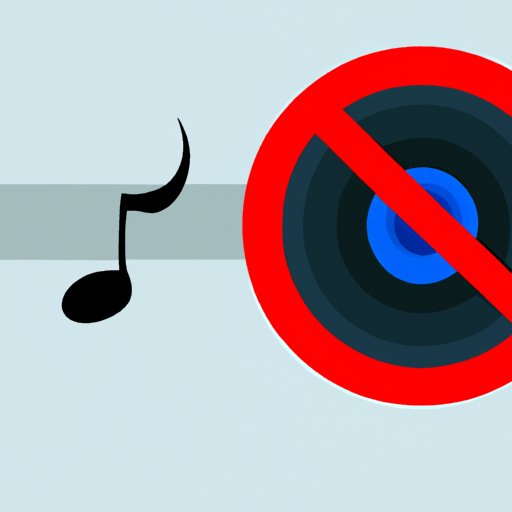Introduction
Playing loud music is a common activity for many people around the world. It is often used to express emotions and create a sense of community. But it can also be disruptive and intrusive, leading to complaints and legal action. So, what exactly is considered “loud music”, and is playing it illegal?
Loud music is generally defined as any sound that exceeds the accepted level of noise for a particular environment. This is usually measured in decibels (dB), with higher dB ratings indicating louder sounds. The average level of noise from normal conversation is around 60 dB, while the average level of noise from a passing car is around 70 dB. Most sound ordinances set the acceptable level of noise at around 65 dB or lower.

Exploring the Legalities of Playing Loud Music in Different Jurisdictions
The legalities of playing loud music vary depending on the jurisdiction. In some places, there are no laws against playing loud music, while in others, there are strict regulations and penalties for those who violate them. Generally, these laws are designed to protect citizens from excessive noise pollution.
In the United States, most states have laws regulating noise pollution. These laws typically restrict the amount of noise that can be made in residential areas, commercial areas, and public spaces. For example, in California, it is illegal to play music that is louder than 55 dB during the day, or 45 dB at night. Violators can face fines of up to $1,000.
In the United Kingdom, there are laws that regulate noise pollution. Under the Environmental Protection Act 1990, local authorities have the power to issue fines for individuals or businesses that cause a statutory nuisance by making too much noise. This includes playing loud music in residential areas.

Examining the Reasons Behind Restrictions on Loud Music
There are a number of reasons why playing loud music is restricted in certain jurisdictions. One of the primary concerns is the impact on quality of life. Excessive noise can disrupt sleep, affect concentration, and cause stress and anxiety. It can also lead to disputes between neighbors and businesses.
Another concern is health and safety. Exposure to loud music can cause hearing damage, particularly if it is played at high volumes over long periods of time. There is also the potential for accidents or injury if people are unable to hear warnings or instructions due to loud music.
Understanding Local Noise Pollution Laws and Their Impact on Music
Local noise pollution laws can have a significant impact on musicians. These laws typically restrict the hours when loud music can be played, as well as the volume at which it can be played. This can make it difficult for musicians to perform in public areas, as they may be limited to playing only during certain times or at low volumes.
In addition, local laws may require musicians to obtain permission or a permit before they can play in public areas. This can involve additional costs and paperwork, and can be a barrier to performing in certain locations. Musicians may also be required to use soundproofing equipment to reduce the volume of their music.

Comparing the Regulations on Playing Loud Music Across Countries
The regulations on playing loud music vary significantly across countries. In some countries, such as Germany, there are no legal restrictions on playing loud music. However, in other countries, such as India, there are very strict laws regulating noise pollution.
For example, in India, the Noise Pollution (Regulation and Control) Rules 2000 regulate the use of loudspeakers and other audio devices. Under these rules, loudspeakers cannot be used after 10 pm in residential areas, and all loudspeakers must be approved by the local authorities. Violators can be fined up to 5,000 rupees.
Investigating How Technology Can Help Reduce Noise Levels
Technology can be used to help reduce noise levels in public spaces. For example, noise-canceling technology can be used to reduce the volume of music without sacrificing its quality. Additionally, soundproofing materials can be used to prevent sound from escaping a venue or area.
These solutions can be beneficial for both musicians and residents. Musicians can use the technology to reduce the volume of their music without sacrificing its quality, while residents can enjoy a quieter environment. In addition, these solutions can help reduce the risk of legal action due to noise pollution.
Exploring Alternatives to Playing Loud Music in Public Areas
If playing loud music in public areas is not an option, there are still ways for musicians to reach their audiences. Indoor concerts can be held in venues that are equipped with soundproofing, allowing musicians to perform without disturbing the peace. Outdoor venues can also be used, provided they are properly soundproofed.
Additionally, online performance platforms can be used to reach audiences without having to worry about noise limits or soundproofing. These platforms allow musicians to livestream their performances, and can be accessed by anyone with an internet connection.
Conclusion
Playing loud music can be a great way to express emotions and create a sense of community, but it can also be disruptive and intrusive. As such, it is important to understand the legalities of playing loud music in different jurisdictions. Generally, these laws are designed to protect citizens from excessive noise pollution.
In addition, there are a number of technologies and solutions that can help reduce noise levels, as well as alternatives to playing loud music in public areas. By understanding the legalities and exploring these options, musicians can ensure that their performances are both enjoyable and compliant with noise regulations.
(Note: Is this article not meeting your expectations? Do you have knowledge or insights to share? Unlock new opportunities and expand your reach by joining our authors team. Click Registration to join us and share your expertise with our readers.)
